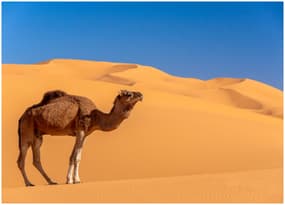Adaptations of Organisms
Adaptations of Organisms: Overview
This topic covers concepts, such as, Migration as an Adaptation Strategy, Hibernation, Seasonal Migration & Strategies of Adaptations in Animals etc.
Important Questions on Adaptations of Organisms
The environment is a surrounding or condition where living and non-living things live or operate.
What is the definition of environment.
Explain the characteristics of Savanna Grassland.
Terrestrial plants are adaptable to live in the water.
_____ feet help the Ducks to swim and to keep their balance on muddy riverbanks.
Which of the following is an adaptation that helps a seal survive in a cold habitat?
Give two examples of adaptations in organism due to seasonal changes.
Time during the year with certain set of physical factors is called season.
Some flowers close in day to keep their pollen safe.
What are the adaptations of sea anemones?
Imagine yourself as an explorer, who came across a new habitat during your search. Describe the habitat. Also, name anyone animal and plant living there. You also have to write about their source of food and shelter for the animal. Then, make a sketch of the animals and plant.
Sampling is a technique adopted to select a sample.
The sampling error may be positive or negative or zero.
Sample size means number of units in a sample.
When the entire stem with its all branches become green, flat, fleshy leafy to do photosynthesis and leaves are modified into spines, it is called a
While walking along the beach, you see a fish washed ashore and struggling. Would you put it back into the water or ignore it?
Long, stiff hair between _____ of a polar bear's feet protects it from cold and prevents it from slipping on ice.
How do bats fly in the dark, without striking any object?
Like bats, which are other animals that can see in the dark.
What type of animal is this? (Desert animal/ Arctic animal/ Forest animal)

